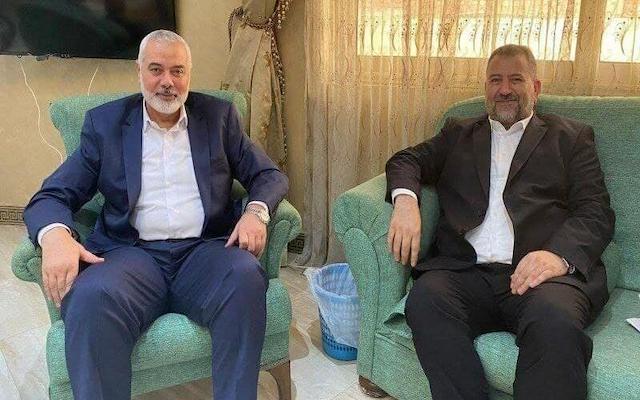In a dramatic turn of events, the Lebanese newspaper Al Akhbar recently shed light on the intricate assassination of Saleh Al-Arouri, a top Hamas official, in Beirut's Dahieh district. This strategic operation, which has significantly impacted the region's geopolitics, unveils a complex narrative involving Israel, Hamas, and Hezbollah that includes surveillance, countersurveillance and a massive failure to listen to the fruits of those surveillance operations.
Al-Arouri, widely known as "The Architect of October 7," was reportedly under Israeli surveillance, a fact underscored by Hezbollah's warning to him prior to the attack. The significance of his role in Hamas was further highlighted by his involvement in orchestrating the kidnapping and murder of three Israeli teenagers in 2014, an act that precipitated Operation Protective Edge in Gaza.
#Al-Arabiya Advisor for Military Affairs Riyad Kahwaji: #Hezbollah’s response to the assassination of #Saleh_Al-Arouri will be qualitative and limited to avoid sliding into a war that #Israel wants pic.twitter.com/Y56oK5IZNe
— Muhammad Yousaf (@MuhammadYo95978) January 3, 2024
The targeted office, initially evacuated following the October 7 massacre, was reoccupied mere hours before the strike, a move that possibly betrayed Al-Arouri's location. The aftermath of the assassination saw a swift and suspicious cleanup operation, allegedly to remove critical Hamas documents, before Lebanese intelligence could intervene.
Lebanese Prime Minister Najib Mikati condemned the assassination as an "Israeli crime," framing it as a breach of national sovereignty. This stance is echoed by Hezbollah-affiliated Al-Manar, which interpreted the event as a sign of Israel's refusal to accept the status quo in Gaza and the northern front.
Hezbollah reportedly warned Hamas deputy Saleh Al-Arouri a short time before his elimination in Beirut this week that Israel was closely monitoring his every move, Lebanese Al-Akhbar reports.
— Ariel Oseran (@ariel_oseran) January 4, 2024
According to the report, the apartment in which Al-Arouri was targeted served as a… pic.twitter.com/6fNcU97Dv1
Israeli motives, though officially unacknowledged, are speculated to revolve around restoring deterrence and influencing the resistance's acceptance of a Western-promoted diplomatic solution. The timing of the attack, coinciding with the arrival of U.S. envoy Amos Hochstein, suggests a strategic move to assert dominance over Hamas, not just in Gaza but globally.
Sources suggest that Israel's intention was not to provoke Hezbollah but to create a tactical embarrassment for the organization. Hezbollah's response, or lack thereof, could impact its standing within the resistance axis and Lebanon's role in regional conflicts.
🇱🇧🇮🇱 🔴‼️ BREAKING: HAMAS' SALEH AL-AROURI WAS WARNED OF ASSASSINATION
— Lounge Digest (@loungedigest) January 4, 2024
Before his assassination, Saleh al-Arouri received a warning from Hezbollah, "Israel is following your every move." Also, the building in which al-Arouri was killed was evacuated immediately after Oct. 7th.… pic.twitter.com/XNnX4FT7u4
The attack's precision, highlighted by the Lebanese security official's account of the fighter jet's missile strike, underscores the sophistication and accuracy of the operation. This precision strike, resulting in the death of Al-Arouri and six other Hamas members, marks a significant blow to Hamas' operations, especially in the West Bank.
In a symbolic gesture, the IDF demolished Al-Arouri's family home, displaying a sign equating Hamas with ISIS, a stark indication of Israel's stance on the organization. This act, along with the recent assassination, underlines the ongoing conflict and the lengths to which Israel will go to combat what it perceives as a persistent terrorist threat from Hamas.


